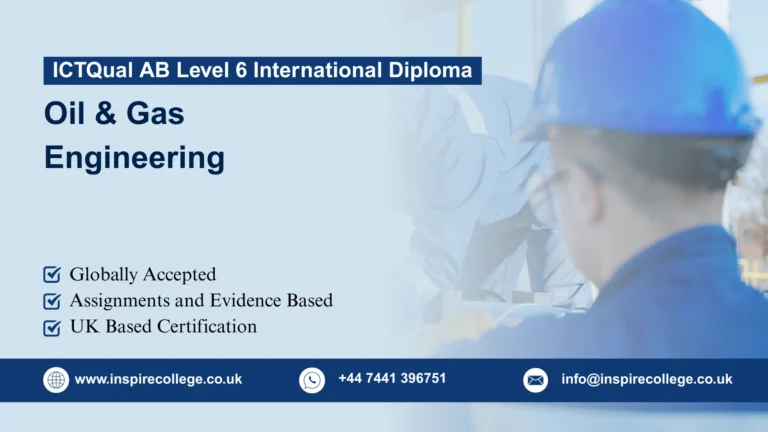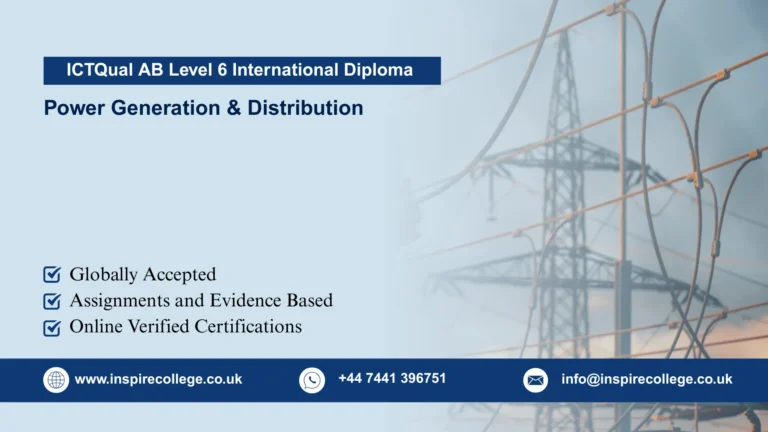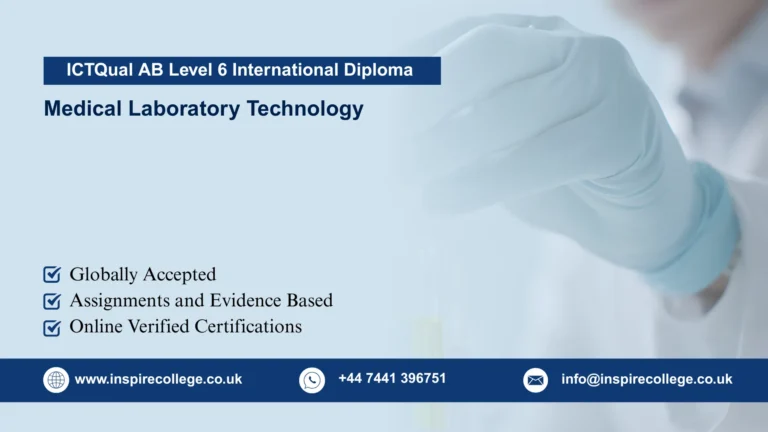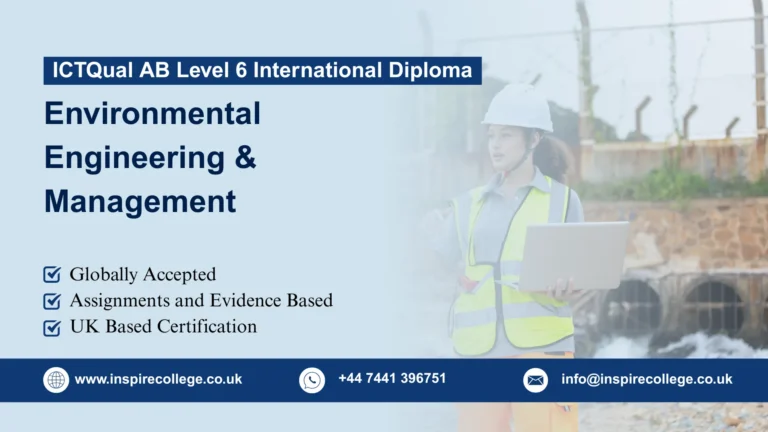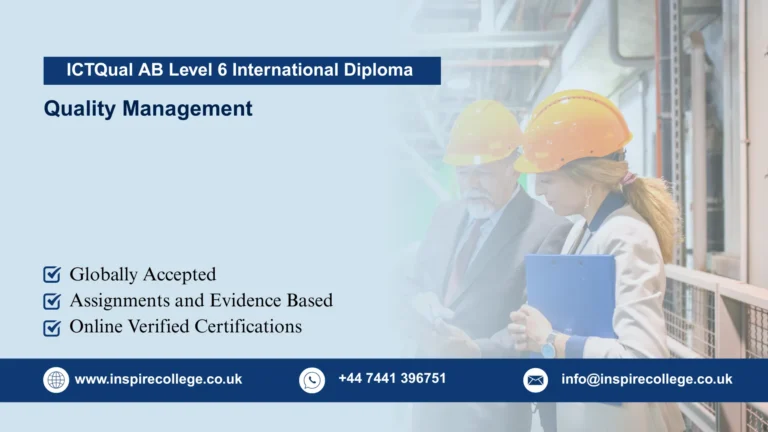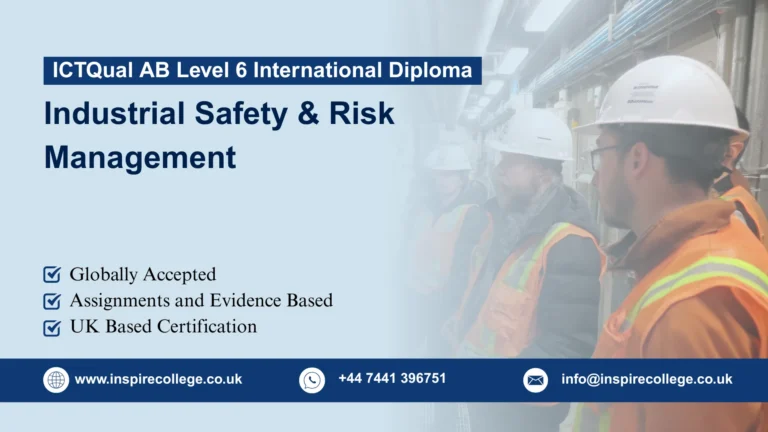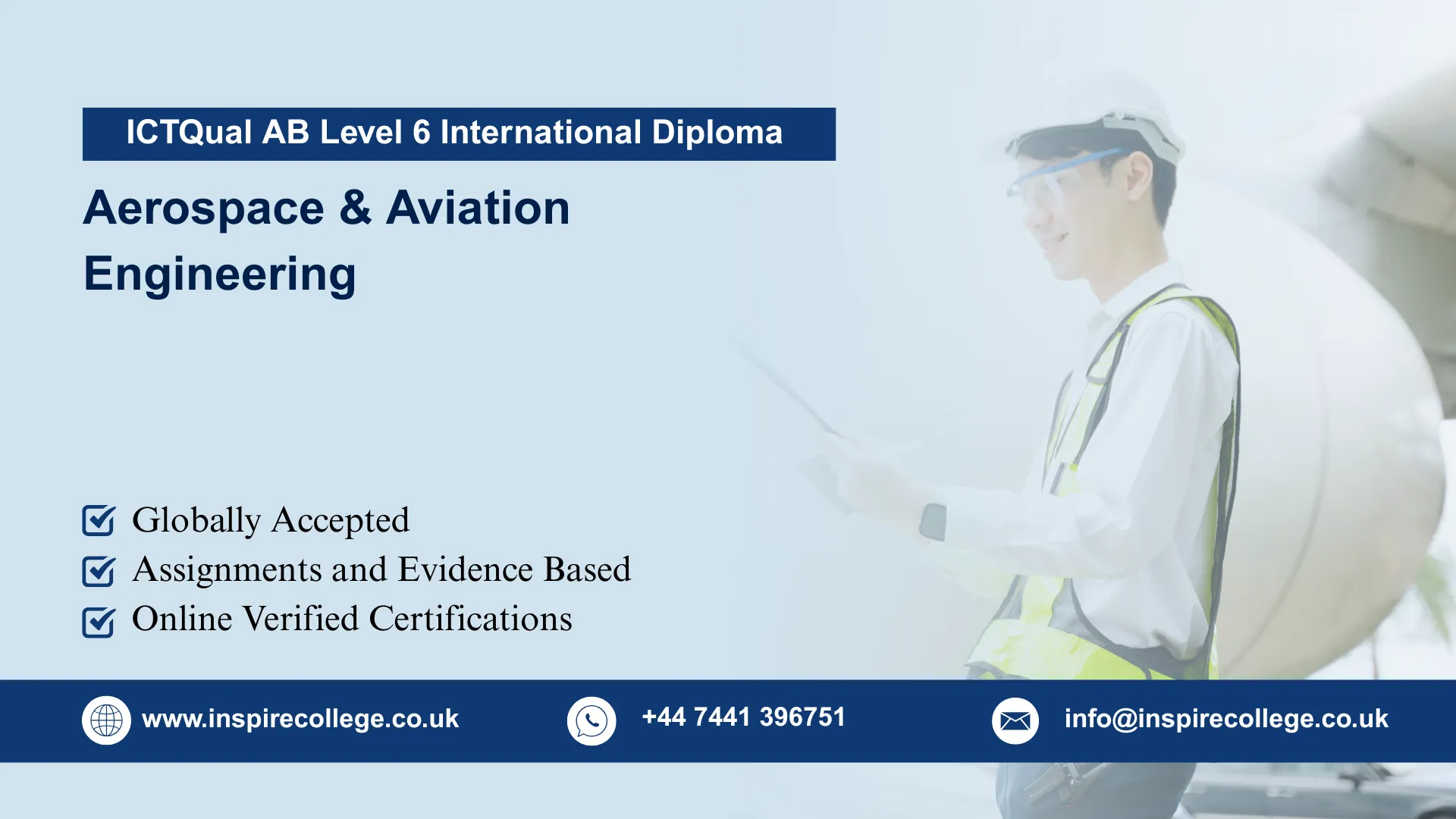
ICTQual AB Level 6 International Diploma in Aerospace & Aviation Engineering
The ICTQual AB Level 6 International Diploma in Aerospace & Aviation Engineering is a cutting-edge programme designed to equip learners with advanced knowledge and practical expertise in the dynamic aerospace and aviation industry. As global air travel and aerospace technology continue to expand, skilled professionals are in high demand to design, maintain, and manage aircraft systems, aeronautical engineering projects, and aviation operations.
ICTQual AB Level 6 International Diploma in Aerospace & Aviation Engineering provides a comprehensive understanding of aerospace engineering principles, aircraft design, propulsion systems, avionics, flight mechanics, and airport operations. Learners will develop critical skills in problem-solving, system analysis, and technical decision-making, enabling them to contribute effectively to innovative aerospace projects and aviation safety initiatives.
ICTQual AB Level 6 International Diploma in Aerospace & Aviation Engineering is tailored for both fresh learners and experienced professionals. Fresh graduates gain a solid foundation to launch a successful career in aerospace and aviation engineering, while working professionals enhance their technical knowledge and leadership capabilities to progress in advanced roles. Practical applications, laboratory work, simulation exercises, and industry-aligned projects ensure that learners acquire hands-on experience alongside theoretical expertise.
Graduates of this internationally recognised programme will be prepared for careers in aircraft design, aerospace manufacturing, aviation management, flight testing, maintenance engineering, and research & development.ICTQual AB Level 6 International Diploma in Aerospace & Aviation Engineering also serves as a strong foundation for further postgraduate studies in aerospace, aviation, and related engineering disciplines.
With a focus on innovation, technical excellence, and global industry standards, the ICTQual AB Level 6 International Diploma in Aerospace & Aviation Engineering empowers learners to excel in one of the most challenging and rewarding fields of engineering worldwide.
The ICTQual AB Level 6 International Diploma in Aerospace & Aviation Engineering is designed for learners seeking to advance their knowledge and skills in aerospace and aviation engineering. To ensure success in this programme, applicants must meet the following entry requirements:
Age Requirements
- Learners must be at least 18 years of age at the time of enrolment.
Educational Requirements
- A minimum of a high school diploma or equivalent qualification in science, mathematics, or engineering-related subjects.
- Applicants with prior vocational training or diplomas in engineering, mechanical, or aeronautical disciplines are encouraged to apply.
Professional Experience
- For experienced professionals: At least 6 years of verifiable work experience in aerospace, aviation, or related engineering sectors may provide eligibility for a fast-track certification route.
- Fresh learners or recent graduates are required to complete the full set of 36 assignments to achieve the diploma.
English Language Proficiency
- Learners must demonstrate proficiency in English, equivalent to IELTS 5.5 or higher, or an approved alternative qualification.
- Strong English communication skills are essential for comprehending technical material, completing assignments, and engaging in practical projects.
This entry-level framework ensures that all learners have the necessary academic knowledge, technical aptitude, and language skills to successfully progress through the three-year, 360-credit programme. By meeting these requirements, learners are well-prepared to gain advanced expertise in aerospace and aviation engineering and pursue global career opportunities.
Mandatory Units
This qualification, the ICTQual AB Level 6 International Diploma in Aerospace & Aviation Engineering360 Credits – Three Years, consists of 36 mandatory units.
Year 1 – Foundation in Aerospace & Aviation Engineering
- Principles of Aerospace and Aviation Engineering
- Engineering Mathematics
- Fundamentals of Mechanical and Electrical Engineering
- Materials Science and Engineering
- Engineering Drawing and Computer-Aided Design (CAD)
- Introduction to Aerodynamics and Flight Mechanics
- Basics of Propulsion Systems
- Aircraft Structures – Fundamentals
- Avionics and Electrical Systems – Basics
- Health, Safety, and Environmental Practices in Aviation
- Communication and Technical Report Writing
- Introduction to Project Management in Engineering
Year 2 – Intermediate Studies in Aerospace & Aviation Engineering
- Aerodynamics and Fluid Dynamics – Applications
- Propulsion Systems and Gas Turbine Engines
- Aircraft Structural Analysis and Design
- Avionics and Navigation Systems
- Flight Mechanics and Performance Analysis
- Aerospace Materials and Manufacturing Processes
- Aircraft Maintenance and Reliability Engineering
- Systems Engineering in Aerospace Projects
- Unmanned Aerial Vehicles (UAV) – Fundamentals
- Sustainable Aviation and Green Technologies
- Applied Research Methods in Aerospace Engineering
- Project Planning and Aviation Operations Management
Year 3 – Advanced Studies in Aerospace & Aviation Engineering
- Advanced Aerodynamics and Computational Fluid Dynamics (CFD)
- Advanced Propulsion and Rocket Systems
- Advanced Structural Analysis and Composite Materials
- Flight Control Systems and Automation
- Space Systems Engineering and Satellite Technology
- Robotics and Autonomous Systems in Aviation
- Smart Aviation Technologies and Industry 4.0
- Aviation Safety, Risk, and Quality Management
- Cyber-Physical Systems and IoT in Aerospace Engineering
- Professional Ethics and Sustainability in Aerospace Engineering
- Innovation, Entrepreneurship, and Aviation Business Development
- Final Year Major Project (Capstone Project)
This internationally recognized diploma equips learners with a robust foundation, intermediate expertise, and advanced technical competencies in aerospace and aviation engineering. Graduates gain hands-on experience, critical problem-solving skills, and industry-relevant knowledge, preparing them for careers in aircraft design, maintenance, aerodynamics, propulsion systems, avionics, and aerospace project management. The program emphasizes practical application, innovation, sustainability, and adherence to global aviation standards.
Year 1 – Foundation in Aerospace & Aviation Engineering
1. Principles of Aerospace and Aviation Engineering
- Explain fundamental concepts of aerospace engineering, aircraft operations, and aviation systems.
- Apply principles of flight mechanics to basic aircraft design scenarios.
- Analyze the roles of aerospace engineers in commercial, defense, and research aviation sectors.
2. Engineering Mathematics
- Solve engineering problems using advanced mathematical techniques, including calculus and linear algebra.
- Apply mathematical modeling to analyze flight trajectories and aerodynamics.
- Develop quantitative reasoning skills for engineering design and performance evaluation.
3. Fundamentals of Mechanical and Electrical Engineering
- Demonstrate an understanding of mechanical systems and electrical circuits in aircraft engineering.
- Apply engineering principles to basic mechanical and electrical design tasks.
- Conduct practical experiments to validate theoretical engineering concepts.
4. Materials Science and Engineering
- Identify aerospace-grade materials and their properties for structural and functional applications.
- Evaluate material selection criteria for safety, durability, and performance in aviation.
- Conduct laboratory tests to assess mechanical and thermal properties of engineering materials.
5. Engineering Drawing and Computer-Aided Design (CAD)
- Produce accurate technical drawings and 3D models for aerospace components.
- Utilize CAD software to simulate aircraft components and assemblies.
- Interpret engineering schematics to support design and manufacturing processes.
6. Introduction to Aerodynamics and Flight Mechanics
- Describe the principles of aerodynamics, lift, drag, and stability in flight.
- Analyze aircraft performance under different operational conditions.
- Apply computational tools to predict airflow and aerodynamic behavior.
7. Basics of Propulsion Systems
- Explain the working principles of jet engines, turboprops, and other propulsion systems.
- Evaluate engine performance metrics and efficiency factors.
- Conduct basic simulations of propulsion system operations.
8. Aircraft Structures – Fundamentals
- Identify primary and secondary aircraft structures and their functions.
- Apply structural analysis techniques to ensure safety and integrity.
- Understand failure modes and basic maintenance considerations.
9. Avionics and Electrical Systems – Basics
- Explain the function of avionics systems and aircraft electrical circuits.
- Analyze the integration of communication, navigation, and monitoring systems.
- Conduct hands-on exercises to demonstrate system operations.
10. Health, Safety, and Environmental Practices in Aviation
- Apply aviation safety protocols and regulatory compliance in engineering tasks.
- Conduct risk assessments to identify and mitigate operational hazards.
- Promote environmentally sustainable practices in aerospace operations.
11. Communication and Technical Report Writing
- Develop technical documentation for engineering projects.
- Communicate complex concepts clearly to technical and non-technical audiences.
- Utilize standard reporting formats for aviation engineering projects.
12. Introduction to Project Management in Engineering
- Explain project life cycles and management principles in engineering contexts.
- Develop project schedules, budgets, and resource plans.
- Apply project management tools to small-scale aerospace projects.
Year 2 – Intermediate Studies in Aerospace & Aviation Engineering
1. Aerodynamics and Fluid Dynamics – Applications
- Model fluid flow and aerodynamic forces in real-world aircraft scenarios.
- Conduct experiments to analyze airflow patterns and lift-to-drag ratios.
- Apply computational fluid dynamics (CFD) tools to solve engineering problems.
2. Propulsion Systems and Gas Turbine Engines
- Evaluate gas turbine engine performance under various flight conditions.
- Apply thermodynamic principles to optimize engine efficiency.
- Analyze propulsion system failures and propose corrective measures.
3. Aircraft Structural Analysis and Design
- Conduct stress and strain analysis for different aircraft structures.
- Design lightweight and durable components using engineering principles.
- Apply finite element methods to simulate structural behavior.
4. Avionics and Navigation Systems
- Integrate avionics systems for navigation, communication, and monitoring.
- Evaluate system performance and troubleshoot operational issues.
- Apply software tools to simulate navigation and control systems.
5. Flight Mechanics and Performance Analysis
- Analyze aircraft performance data to improve operational efficiency.
- Apply flight dynamics principles to optimize stability and control.
- Conduct simulations for takeoff, landing, and in-flight maneuvers.
6. Aerospace Materials and Manufacturing Processes
- Select materials and manufacturing methods for aerospace applications.
- Analyze advanced composites and lightweight alloys for aircraft components.
- Implement quality control techniques in production processes.
7. Aircraft Maintenance and Reliability Engineering
- Develop maintenance schedules to ensure aircraft safety and compliance.
- Apply reliability engineering methods to assess component lifecycles.
- Conduct practical inspections and maintenance procedures.
8. Systems Engineering in Aerospace Projects
- Apply systems engineering principles to design complex aerospace projects.
- Integrate subsystems for optimal performance and safety.
- Utilize modeling tools to predict system interactions and outcomes.
9. Unmanned Aerial Vehicles (UAV) – Fundamentals
- Explain UAV design, control systems, and operational principles.
- Conduct flight simulations and basic UAV operations.
- Analyze UAV applications for commercial and defense sectors.
10. Sustainable Aviation and Green Technologies
- Evaluate environmental impact of aviation systems and operations.
- Propose sustainable practices for aircraft design and fuel efficiency.
- Implement green technologies to reduce emissions and operational footprint.
11. Applied Research Methods in Aerospace Engineering
- Design research projects to solve engineering problems.
- Apply data collection, statistical analysis, and validation techniques.
- Present findings in structured, professional reports.
12. Project Planning and Aviation Operations Management
- Develop comprehensive project plans for aerospace initiatives.
- Manage resources, budgets, and timelines effectively.
- Apply operational management techniques for aviation efficiency.
Year 3 – Advanced Studies in Aerospace & Aviation Engineering
1. Advanced Aerodynamics and Computational Fluid Dynamics (CFD)
- Apply advanced CFD techniques to optimize aircraft performance.
- Analyze turbulent flow, wing design, and high-speed aerodynamics.
- Conduct simulations to support research and design innovations.
2. Advanced Propulsion and Rocket Systems
- Evaluate rocket and jet propulsion systems for aerospace applications.
- Analyze thermodynamic cycles and thrust performance metrics.
- Conduct design studies for advanced propulsion technologies.
3. Advanced Structural Analysis and Composite Materials
- Perform stress analysis on complex aerospace structures.
- Apply advanced composite materials for lightweight and durable designs.
- Utilize simulation tools to predict failure modes and safety margins.
4. Flight Control Systems and Automation
- Design and analyze automated flight control systems.
- Evaluate system response, stability, and redundancy measures.
- Conduct practical simulations for autonomous flight operations.
5. Space Systems Engineering and Satellite Technology
- Apply engineering principles to satellite design and space missions.
- Analyze orbital mechanics, communication systems, and payload integration.
- Develop strategies for space system reliability and efficiency.
6. Robotics and Autonomous Systems in Aviation
- Design and implement robotic solutions for aircraft maintenance and operations.
- Integrate autonomous systems for enhanced safety and efficiency.
- Analyze control algorithms for aviation robotics applications.
7. Smart Aviation Technologies and Industry 4.0
- Apply IoT, AI, and data analytics in aviation systems.
- Evaluate digital twins, predictive maintenance, and smart manufacturing.
- Implement Industry 4.0 solutions for aviation optimization.
8. Aviation Safety, Risk, and Quality Management
- Conduct comprehensive risk assessments for aerospace projects.
- Apply quality management systems to ensure compliance with standards.
- Implement safety protocols to mitigate operational hazards.
9. Cyber-Physical Systems and IoT in Aerospace Engineering
- Integrate cyber-physical systems into aircraft and aerospace operations.
- Analyze IoT data for predictive maintenance and system optimization.
- Evaluate security and resilience of connected aerospace systems.
10. Professional Ethics and Sustainability in Aerospace Engineering
- Apply ethical principles to engineering decision-making and leadership.
- Promote sustainable practices in aerospace operations and design.
- Evaluate the societal and environmental impact of engineering solutions.
11. Innovation, Entrepreneurship, and Aviation Business Development
- Develop business plans for aerospace ventures and startups.
- Apply innovation strategies to address industry challenges.
- Assess market opportunities and financial feasibility in aviation.
12. Final Year Major Project (Capstone Project)
- Plan, design, and execute a comprehensive aerospace engineering project.
- Apply interdisciplinary knowledge and technical skills to solve real-world problems.
- Present findings, designs, and recommendations in a professional, industry-standard format.
Upon completing the ICTQual AB Level 6 International Diploma in Aerospace & Aviation Engineering, learners will possess a holistic understanding of aerospace systems, advanced technical skills, and industry-ready competencies. Graduates are equipped to excel in aircraft design, maintenance, propulsion systems, avionics, sustainable aviation, UAV operations, space technologies, and aviation project management. The program ensures readiness for professional roles, further research, or entrepreneurship in the global aerospace sector.
This course is designed for learners who aim to build strong technical expertise and advance their careers in aerospace and aviation engineering. It suits individuals seeking practical skills, industry knowledge, and international recognition in the field.
1. Academic Background and Interests
- Recent school or college graduates with a keen interest in aerospace and aviation engineering
- Learners with a strong foundation in mathematics, physics, or engineering-related subjects
- Individuals passionate about aircraft systems, aerodynamics, propulsion, and avionics
2. Professional Aspirations
- Professionals aiming to advance careers in aerospace, aviation, or defense industries
- Candidates seeking roles in aircraft design, maintenance, UAV operations, or space systems
- Learners targeting project management, research, or technical leadership in aviation engineering
3. Skills and Competencies
- Desire to develop technical, analytical, and problem-solving skills for aerospace applications
- Interest in using modern engineering tools, CAD software, simulation, and computational modeling
- Commitment to learning safety standards, regulatory compliance, and sustainable aviation practices
4. Personal Attributes
- Strong motivation to innovate and apply advanced engineering concepts in real-world scenarios
- Ability to work independently and collaboratively on complex aerospace projects
- Willingness to embrace ethical practices, professional standards, and continuous learning
This course is ideal for learners who are motivated to combine technical knowledge, practical skills, and innovation to excel in global aerospace and aviation careers. Graduates will be prepared for challenging roles in design, operations, research, and management while contributing to sustainable and cutting-edge aerospace solutions
As an approved centre of ICTQual AB, learners must enrol with us to pursue this internationally recognized qualification. The certification route varies depending on prior experience
1. Route for Experienced Professionals (Minimum 6 Years Verifiable Experience)
- Professionals with at least six years of verifiable work experience in aerospace, aviation, or related engineering fields may qualify for an experience-based route
- Candidates are required to submit documented evidence of their professional experience, including references, work portfolios, and relevant project documentation
- Upon verification, learners may be exempted from completing all 36 assignments, focusing instead on applying their practical knowledge and completing any required assessments or project submissions
- This route enables experienced professionals to fast-track certification while validating their existing skills and expertise
2. Route for Fresh Candidates (No Prior Experience)
- Fresh graduates or individuals new to aerospace and aviation engineering must complete the full course curriculum, including all 36 assignments across the three-year program
- Learners will gain foundational, intermediate, and advanced skills through structured learning, practical exercises, and assessment tasks
- Successful completion of all assignments, projects, and assessments ensures the learner meets the standards required by ICTQual AB for Level 6 certification
- This route provides a comprehensive learning experience, preparing candidates for professional roles in the aerospace and aviation industry
Enrolment
- Learners must enrol with our approved ICTQual AB centre to gain access to course materials, assignments, assessments, and guidance throughout the program
- Our centre provides support, mentorship, and verification assistance to ensure all candidates, whether experienced professionals or fresh learners, meet the requirements for the internationally recognized Level 6 Diploma
Register Now
FAQs for ICTQual AB Level 6 International Diploma in Aerospace & Aviation Engineering

